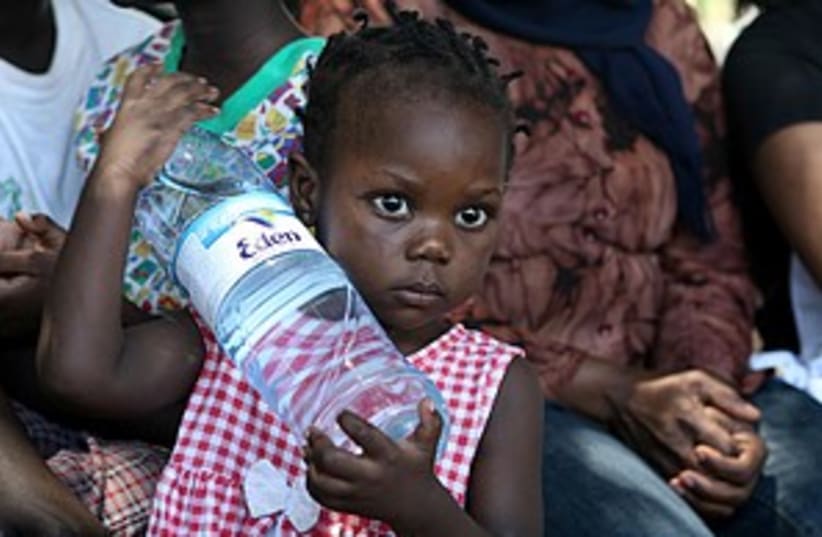NGOs battle to halt deportation of foreign workers' babies
Although there is no legislation on the matter, the Interior Ministry routinely orders foreign workers who have babies here to send them back to their countries of origin within six months.
(photo credit: Ariel Jerozolimski)
Sheryn Davares can't stop thinking about her three-month-old baby Diane. While it's common for a mother to feel attached to her newborn, for Davares that connection is amplified by an Interior Ministry policy for foreign workers and their offspring that has forced her to send little Diane back to the Philippines to live with relatives.
"She left on June 17," Davares, whose story recently gained media attention, told The Jerusalem Post on Thursday. "It is very hard and I just feel depressed all the time."
Although there is no legislation on the matter, the Interior Ministry routinely orders foreign workers who have babies here to send them back to their countries of origin within six months.
Asked why she did not consider returning home with her baby, the 30-year-old mother - who has two additional young children back in the Philippines - explained that she took a $6,000 loan to come here and could not leave before paying it back.
"It will take me at least three years to pay off the loan," said Davares, who arrived in Israel two years ago to work as an elderly care-giver.
"I'm hoping that I will be able to take a vacation to the Philippines in another year and then I can see my daughter." She added: "These laws are very unfair, but we have no choice but to follow them."
According to Romm Lewkowicz, spokesman of the Hotline for Migrant Workers, a grass-roots organization that provides assistance to thousands of foreign workers living in Israel, the Interior Ministry forcing foreign workers to send their babies back home only months after birth is a "well-known phenomenon."
He said that currently, the general policy of the ministry is to automatically revoke the visa of any foreign worker who falls pregnant here. What sets Davares apart, however, is that with the help of human rights lawyer Efrat Mor-Milman, she was able to force the ministry to allow her to keep her visa and, instead, send her baby back to the Philippines.
"None of these situations is ideal," said Lewkowicz. "A woman should have the right to care for her own baby if she so chooses. The problem is that Israel allows these foreign care-givers to come in and permits them to stay here for an extended period but how can they expect them to put their lives on hold?"
The Hotline, together with Kav L'Oved (the workers' hot line), Association for Civil Rights in Israel (ACRI), women's rights organization Na'amat and Physicians for Human Rights recently filed a legal petition in the Supreme Court to force the Interior Ministry to change its policy.
"Foreign workers here generally enjoy the same legal rights as all the country's [other] employees," explained Kav L'Oved lawyer Anat Kidron.
"The only equal rights that do not apply to foreign workers are the laws governing women. In fact, the way the law is right now, foreign worker women are actually punished for getting pregnant. All we ask is that women can come here and get the same treatment as Israeli women."
"We are talking about human beings here," she continued. "We can't only use them when it's good for us but when its bad turn our back on them. If children are born here while someone is working here, then Israel has to find another, more humane way of dealing with them."
While the Supreme Court has yet to deliver its final verdict on the matter, two weeks ago it did issue a recommendation to the Interior Ministry for it to change the general policy of immediately revoking visas for all pregnant foreign workers.
"Instead, we recommend focusing on the circumstances surrounding the birth and how the worker will cope with her current work conditions," wrote the judges.
"If it becomes clear that her performance will remain unaffected then the visa should not be automatically cancelled."
The judges did not refer to the practice of forcing the women to send their babies out of the country.
A spokeswoman for the Interior Ministry, however, told the Post that the office was currently considering the Supreme Court's recommendations.
In the past, Israel allowed babies of migrant workers to stay and be brought up in the country, but that led to thousands of children living here without official status or health insurance. Last year, former interior minister Ronnie Bar-On granted a large number of the children - who had essentially grown up here - Israeli citizenship.
"I don't know why the ministry is so scared of these little babies," said Catalina, another Filipino care-giver, who sent her newborn daughter to live with her parents a year-and-a-half ago. "I had no choice but to send her back if I wanted to keep my visa."
While the 29-year-old stays on to pay off the original loan she took out before coming to work here, she said that not a day goes by without her thinking about her little girl.
"Whenever I have a day off I rush to the Internet café so I can see her on the Web-cam," said Catalina, who cares for a woman with Alzheimers in Bnei Brak.
"Anytime someone goes back there on vacation, I send them with a toy or some clothes for her. I just hope that I will be able to afford to [go] back there for a visit next year. I really miss her."
if(catID != 151){
var cont = `Take Israel home with the new
Jerusalem Post Store Shop now >>

